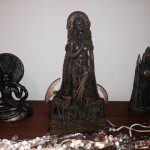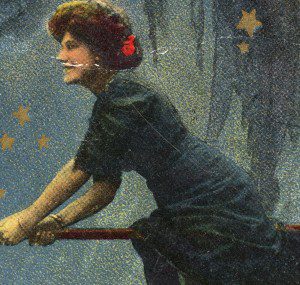When people ask me to describe Paganism I often use the term “polytheism.” Even while saying it I know that what’s coming out of my mouth is a half-truth. Not all Pagans are polytheists; I know a good many atheist Pagans, and there are a lot of Pagans who believe that all the gods throughout history are manifestations of an Ultimate Power, or one god. In some ways, that might make those folks monotheists. There are also hard-core duo-theists, worshipping all the gods of history as “The God” and all the goddesses as “The Goddess.” So yes, Pagan and polytheist is a gross over-simplification.
What makes polytheism such an effective term when describing Modern Paganism is that we use the language of polytheism in ritual. Most of us call to goddesses and gods, and those deities often change from ritual to ritual. Even at our simplest we call to “the Lord and Lady” or perhaps the “Triple Goddess.” So while we all might have conflicting perceptions of deity; within ritual most of us use a language steeped in polytheism.
For the record, I am a polytheist. I believe that the gods I worship are real and that they interact with me. My wife and I both whisper prayers to Dionysus and believe that he hears them. When I’m standing in circle and the High Priestess Draws Down the Moon I think that she’s literally drawing down a goddess who interacts with us humans. I’ve drawn down deity on a number of occasions, and I think that the experience was far more than a trick of the mind.
I don’t pretend to understand deity or its nature, but I think it exists. I don’t care if you believe in that reality or not, but what is important to me is that you accept my reality (and experiences) as valid. For the last decade I have assumed that all of us who gather under the umbrella of the term “Pagan” agree on that point. We may argue about the nature of deity, or whether or not it even exists, but I thought there was unwritten rule stating that we wouldn’t try to invalidate the beliefs of others in our tribe. Unfortunately, I think I was wrong.
This past Sunday an article* by M.J. Lee entitled “Why do people want supernatural gods?” from the website Humanistic Paganism showed up on my Twitter feed. For the record, I’m sure that Ms. Lee did not mean to offend me or anyone else**, but she did. The whole article gets off to a rough start when Ms. Lee writes “I hate to admit it but I do feel some animosity toward hard polytheists. I feel as if they have stolen the gods (which of course belong neither to me nor to them, but to their own time and place).” Animosity? Really? That just seems like such an overreaction. When I talk to my Humanist friends about matters like this (generally over a few pints of good cider) we generally agree to disagree. No one gets a bustle in their hedgerow about it.
What I dislike most (but don’t hate, or feel animosity towards) about that sentence is that I think it’s dishonest. The gods originally appeared during a time when the majority of humans (it not all) had a polytheistic worldview. That worldview changed over time, but Pan was not originally worshipped as a manifestation of nature, he was Pan; a part of nature, and most certainly a supernatural god. It’s impossible for me to steal a god when it’s my worship that most closely mimics the original homage paid to him. I believe that the gods evolve over time, and I have no problem with people worshipping Pan as a symbol, I just don’t want to be belittled for honoring him in a more literal way.
Even in a more modern sense I believe that our founding texts espouse a polytheistic worldview, or at least one where supernatural entities exist. Sitting next to my keyboard are copies of Leyland’s Aradia, and Gerald Gardner’s The Meaning of Witchcraft. Both of these books describe a world with gods in them being treated as gods. Polytheism and the belief in supernatural beings is a part of Paganism’s very roots. Again, I don’t think anyone who calls themselves Pagan needs to be a practicing polytheist, but to be bothered by the presence of polytheism within Paganism does not compute. That’s like being angry that you were served cow when you ordered a cheeseburger. Sure, a vegan bean patty could be considered a type of cheeseburger, but the original version was made out of cow. The original versions of Paganism contain supernatural deities.
The majority of Ms. Lee’s article doesn’t really pertain to me (though I’m always interested in alternative thinking), and is aimed at her Humanistic Pagan audience, but there’s another bit in there worth commenting on. She writes: “I think there is good evidence that the rise of supernatural literalism in paganism and Christianity is not a return to traditional religion but is a reaction to our societal problems . .” What confuses me about that statement is that I’ve always believed that the majority of Pagans possessed a worldview that could be considered “supernatural literalism.”
When I first started on the Pagan*** Path all of my experiences were with people who talked about the gods as gods. “The Lady put Her hand on my shoulder.” “The Morrigan is my matron.” “Cernunnos was there with me.” The literal belief in deity is not a return to anything, it’s something that’s always been there. In my first ten years of Paganism I had just one Pagan friend with an atheist (or even theistic) world view, and now years later, even he’s a polytheist. I just don’t see how a worldview that contains cognitive deities is a return to anything. If anything it’s simply “same old same old.”
Ms. Lee writes “When the gods are conceived as supernatural people this meaning is lost.” The reverse is also just as true, when the gods are conceived as mere symbols meaning is also lost. Gods can certainly be symbols, but that’s not how they were originally conceived. You don’t make sacrifices to a symbol or leave offerings to an idea. In my mind, the gods have meaning because they can be like people. My gods understand the emotions that serve to make us human.
I’ve read Ms. Lee’s article several times now, and while it doesn’t come across as an attack on polytheism, I do think the tone is dismissive. Anyone who is actively involved in a Pagan Community knows hard-core polytheists. If you want to know why people believe in supernatural gods why not just ask? I have no beef with atheist, humanist, or theistic Pagans. We all perceive the world in different ways, and your personal truth in no way diminishes my own. However, I’m not sure animosity is the emotion that one should be feeling when they are the newest arrival at the sandbox.
*Setting up a blog here on Patheos can take awhile, so technically the article I’m addressing is now two sundays old. Sorry about that, but Rome wasn’t built in a day.
**That would be Star Foster’s response, just in case you couldn’t tell by running your mouse or finger over the hyperlink.
***And I’m a huge believer in capitalizing Pagan and Paganism when using them to talk about the modern version. I just thought I should point that out.
















